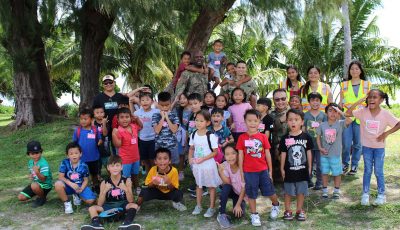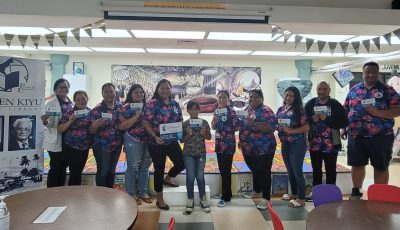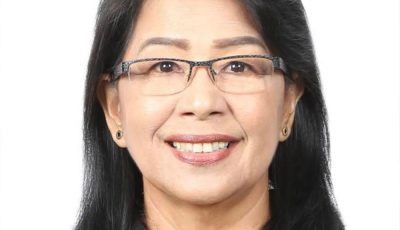HOME program more than visits
Stay-at-home mom Daisy Reyes takes care of her children while her husband Franklin works, both knowing that being parents is a 24-hour job with no holidays. That was especially true for Daisy, who has to juggle taking care of their six children, one of whom has a disability, with household chores.
That’s why getting into the CNMI Healthy Outcomes for Maternal and Early Childhood Visiting Program have been a big help.
The Reyes’ fifth child were among the first 14 children that completed the program, which helps high-risk families take care of children ranging in age from 0 months to 3 years. The graduation was held last Friday at Pacific Island Club Saipan’s Charley’s Cabaret.
The Maternal and Child Health Bureau—under the Division of Public Health Services of the Commonwealth Healthcare Corp.—administers the program that is funded through the U.S. Health Resources and Services Administration.
Daisy Reyes said the program helped her not only with referrals to various agencies that provide assistance to families like them but also the guidance and time spent by caseworkers through their advice.
“Sometimes, you only just want to talk to somebody. I’m reluctant to talk to somebody, for I might hear ‘why do you have many kids?’ That’s why I can talk to the caseworkers, just to let out the stress. It relieves you of the burden.
“The program was a big help for my family. Our children got the referrals they needed with their medicines and healthcare, especially our child with special needs, while our youngest is also in the Early Head Start program.”
Aside from advice and assistance, caseworkers also teach various activities for parents and children. “They bring stuff for the kids to enjoy while we talk. Plus, they teach us family activities.”
“I learned a lot from the program, like how to manage time with my kids. I don’t know some of these activities and I’m thankful to learn them for our kids, through the guidance of my caseworkers.”
Reyes also thanked sponsors of the program in providing them with some house essentials, given to them by the caseworkers every time they make their frequent home visits.
Model families
DPHS director Margarita Torres-Aldan said the families of the 14 program graduates now have the honor of being role models to other CNMI families. “All of you now have the honor of being role models to families who have yet to enroll or are new to the program.”
“All of you have the honor to be proud of the successes that you as families achieved throughout the past three to four years. The successes ensured the wellness of your children through nutrition.”
Torres-Aldan added that the program also assures that the kids are up-to-date with their immunization, get preventive healthcare, achieve their family- and child-related goals, and maintain a healthy relationship with their kids.
The HOME Visiting Program also helps families to make sure that the children are healthy and are receiving care through Medicaid, and their benefits from the Nutrition Assistance Program.
HOME also helps parents learn various parenting skills through an approved curriculum modeled from the Healthy Families of America, where the caseworkers are trained and licensed to teach.
Process
HOME Visiting Program coordinator Yuline Fitial said the program is open to high-risk families, kids from 0 months to 3 years, “mothers who are over-burdened or with high levels of stress, victims of domestic violence, late pre-natal care, or a history of substance abuse issues.”
“Families must go through a two-step process with assessment and screening to see if they are eligible. But they must enroll before the child turns 3 months.”
Families have the option to keep their kids in the program.



























